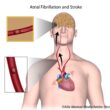Obesity and Stroke Risk
The Heavy Matter: How Obesity Raises the Risk of Strokes
Stroke comprises a complicated web of risk factors and is one of the major causes of disability and death worldwide. Obesity is a major contributing factor; it is a condition marked by an excessive accumulation of body fat. This blog post explores the link between obesity and stroke risk, outlining the detrimental effects of being overweight on your health and the elevated risk of stroke.
Table of Contents

Recognizing the Risk of Stroke from Obesity
Obesity and Stroke Risk
The risk of stroke is increased by obesity via multiple mechanisms:
- Chronic low-grade inflammation: Obesity causes low-grade, persistent inflammation all over the body. This inflammation can lead to plaque accumulation and blood vessel damage, constricting arteries and raising the risk of blood clots.
- High blood pressure: Carrying extra weight strains the heart and makes it work harder to pump blood. High blood pressure is a major risk factor for stroke that might result from this.
- Insulin resistance: The inability of your body to control blood sugar levels is a disorder that can be brought on by obesity. This may worsen blood vessel damage and inflammation even further.
- Sleep apnea: Obesity patients are more likely to suffer from obstructive sleep apnea, a disorder that causes breathing to stop and start repeatedly while they are asleep. Oxygen deprivation caused by sleep apnea can damage blood vessels and raise the risk of stroke.
- Metabolic syndrome: Those who are obese are more likely to have a cluster of illnesses known as metabolic syndrome, which includes high blood pressure, high blood sugar, and abnormal cholesterol levels. All of these factors raise the risk of stroke.
To what extent does obesity raise the risk of stroke?
Obesity and Stroke Risk
The severity of obesity determines how much it raises the risk of stroke. This is an explanation:
- Overweight: Approximately 22% more strokes occur in people who are overweight.
- Obesity: Up to 64% more strokes occur in those who are obese.
- Morbid obesity: Individuals who are extremely obese run a higher risk.
Obesity and Stroke Risk
Keep in mind that these are only approximations. Other health-related factors, such as age, family history, and lifestyle choices, might also affect an individual’s risk.
Beyond the Stats: Obesity’s Effect on Stroke Results
Obesity and Stroke Risk
Obesity can have a detrimental effect on recovery from a stroke, even if you survive one. Being overweight can impede your capacity to restore function and mobility throughout therapy. Furthermore, obesity raises the likelihood of having another stroke, which is a serious long-term health issue.
Taking Initiative: Lowering Your Stroke Risk with Weight Control
Obesity and Stroke Risk
Fortunately, even a small reduction in weight can substantially lower your risk of stroke. Here are some actions that you can do:Obesity and Stroke Risk
Fortunately, even a small reduction in weight can substantially lower your risk of stroke. Here are some actions that you can do:
- Diet: Pay attention to a balanced diet that is high in whole grains, fruits, vegetables, and lean protein. Minimize sugar-filled beverages, processed foods, and harmful fats.
- Exercise: Take regular breaks from the screen to go for walks, swims, or bike rides. Try to get in at least 150 minutes a week of moderate-to-intense activity.
- Speak with a physician or certified nutritionist; they can design a customized weight-loss program that fits your unique requirements and tastes.
- Think about weight-loss surgery: Bariatric surgery may be a useful alternative for severely obese people to lose weight and lower their risk of stroke.
In summary, managing weight can prevent strokes in the future.
Obesity and Stroke Risk
Although obesity is a major risk factor for stroke, it is not a given. Your risk of stroke can be considerably decreased and your general health can be enhanced by controlling your weight with exercise and a nutritious diet. Recall that even little adjustments can have a significant impact. Gaining control of your weight is a big step toward a stroke-free, healthier future.


